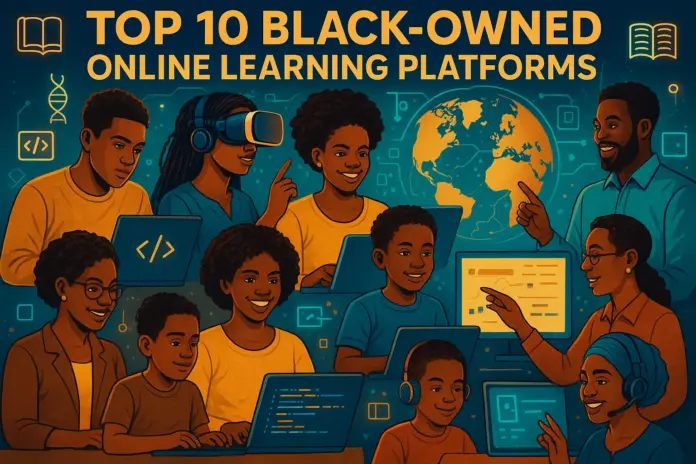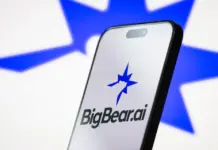In a word where access to quality education is still restricted by geography, income or identity, black owned online learning platform break barrier and redefine opportunity. These Newer platforms are not only teaching skill but are driving empowerment, exclusively and shaping for future generation of thinkers, creators and leaders across Africa and the global black diaspora. From coding bootcamps and STEM Universies two tailor made K-12 apps and centres for creative and upskilling these top 10 Black-Owned Online Learning Platforms portals are reshaping learning and who gets a chance to thrive in the digital age.
1. Black Girls Code (BGC) (US & South Africa)
Black Girls Code (BGC) is an opportunity-redefining nonprofit, Black-owned, and engaged in creating access to technology education for girls of color. In response to this critical question, “Who is coding our future?” BGC makes early and long-term coding pathways available for girls aged 7 to 17 to explore coding, robotics, AI, and other emerging technology. Interactive online programs like Code Along Jr. allow BGC to introduce the latest generation of young students to platforms such as Scratch, Python, and AI tools in a fun, creative, and supportive environment.
The reach of the initiative is highly impressive, with over 40,000 learners in live and online workshops since 2011, and 8-plus millions of views to digital content worldwide. In 2024 alone, the numbers already show that 4,766 learners participated in programs-this was a 47% increase from the previous year.
BGC’s comprehensive approach fuses technical skills with mentorship, leadership development, and community-building. Summer camps, YouTube tutorials, and immersive experiences are offered to young Black girls to equip them not only with coding skills but also with the self-assurance and vision to direct the future of technology.
Also read: Best Places for Black Families to Visit in June to Reconnect & Explore
2. Career Karma (US)
Are your career needs or job training programs drifting into Career Karma because of an amiss selling? Career Karma enables students to compare thousands of programs over 9,000, read authentic student reviews, and reach out to current students or alumni if they’re into tech boot camps, trade schools, or new directions for their lives.
You shouldn’t have to figure everything out on your own. With peer mentoring and coaching, you will join a community of over 150K people who are learning, growing, and supporting each other each day! The platform is mobile friendly and insures that you find your right program, prep for admission, and get inspired by the real success stories.
Career Karma is a site created to help you, regardless of whatever background you might have, land that career you have always wanted. Backed by big-dollar investor partnerships and fortified by a team that values diversity and resilience with innovation driving them, the platform aims to guide a billion people over the next ten years. Are you ready to level up your future? Get the Career Karma app today and begin your journey.
3. Lesson (Nigeria)
One of the earliest EdTech platforms in Nigeria, uLesson by Sim Shagaya emerged in 2019 with a view of enhancing learning amongst primary and secondary school students all over Africa. The uLesson mobile app offers over 1,000 expertly made video lessons and 10,000 interactive activities in core subjects such as mathematics, biology, chemistry, and physics, helping students prepare for the West African examinations, namely WASSCE, SSCE, GCE, and UTME.
Major features of the uLesson app that set it apart include accessibility and engagement. The application features performance tracking and interactive quizzes, and most importantly, it can still be used offline through a bundled SIM card-meaning students can use this app for learning anywhere. The pricing has also been kept affordable with free introductory content and flexibility on subscription options.
Created by some of the best educators, these lessons are adorned with best animations to amplify effective and fun learning. Being one of the fast-growing names in African education, the platform intends to fill the learning gaps and equip students with tools to excel academically and in life.
4. AltSchool Africa (Nigeria)
AltSchool Africa is an online digital learning platform based in Nigeria. It came to existence in 2021 by the hands of Adewale Yusuf, Akintunde Sultan, and Opeyemi Awoyemi, Startup School Graduate 2022. It comes with an ASIC Accreditation, and offers a pragmatic tech-based approach to education for African learners focused on career growth alternative to the normal academic path. AltSchool offers concentrated programs in Engineering, Data, Cybersecurity, Product, Business, and Creative Economy. Setting a target to train 10 million Africans in skills demanded in the market within the next ten years, the platform uses a mixture of practical learning and state-of-the-art tools to attract students. It presents flexible, remote learning opportunities that give potential to people to shape their destiny and form a key part in the digital and socio-economic uplift of Africa.
Also read: Top 10 Affordable Overwater Bungalows to Book in 2025
5. Afrilearn (Nigeria)
Afrilearn is the leading K–12 personalized learning app in Africa, helping over 3 million students, parents, teachers, and schools across the continent. It provides class notes aligned to the curriculum, animated video lessons, tutorial coding sessions, mock exams, and interactive quizzes, all for the various syllabi of WAEC, JAMB, BECE, NECO, and more . Its unique “Learn & Earn” mode allows kids to build up digital currency as they learn, creating fun and motivation . Afrilearn being accessible on low-end devices, coupled with 24/7 homework support via AskAfri and AI-assisted school management tools, makes it an easy choice for improving student performance—80% observe improved test scores within just a week—and creating the best operation for schools .
6. Tuteria (Nigeria)
Tuteria is Africa’s leading marketplace that links learners with tutors duly screened and rated highly for online or in-person engagements. The platform started in Nigeria in 2015 and has since expanded to 450+ subjects-from academic subjects to test prep, languages, music, and practical skills. Tutors are vetted through ID verification, qualification screening, and competency testing. Members enjoy benefits such as customized learning plans, progress tracking, and scheduling flexibility. Tutors have earned over ₦516 million, with 358,000+ lesson hours delivered to 23,000+ students, making Tuteria a tool by which families and educators may access quality, affordable education.
7. Ubongo (Tanzania)
Ubongo: Africa’s leading social edutainment enterprise, founded in Tanzania in 2013, offers localized learning through TV, radio, cellular, and online avenues. With award-winning productions such as Akili and Me (ages 3–6) and Ubongo Kids (ages 7–12), these learning adventures in animation, songs, and stories aim to teach children basic numeracy, literacy, STEM, and socio-emotional skills . Present in 40+ countries with 11 languages, Ubongo gets its media content viewed by more than 17 million families every week. Viewers of these shows, as studies have demonstrated, lead to at least a 24% improvement in numeracy and 12% in school readiness . Being a non-profit, Ubongo harnesses multi-platform content distribution and a solid research base to make learning enjoyable, equitable, and impactful for African children.
8. Go1 (South Africa)
Since its establishment in 2015, Go1 has been a global L&D ecosystem trusted by over 10,000 organizations. It is a subscription model with a headliner-curated library of 150,000+ training materials from 250+ content providers, ranging from compliance, leadership, technical skills, to soft skills. Go1 is easily integrated with 70+ HR tech platforms such as Microsoft Teams, ADP, and others with LMSs, ensuring smooth content delivery, tracking, certification, and analytics that are available right from desktop or mobile. Featuring AI-driven search, personalized learning paths, and multilingual courses, Go1 empowers L&D teams to automate their administrative tasks and ramp-up engagement to completion of training.
9. Semicolon (Nigeria)
Rooted in 2019 by the Immannuels, Semicolon Africa became one of Nigeria’s premier edtech startups with the mission to fully prepare aspiring software engineers and techpreneurs for their profession through one year of rigorous training and preparation for. Basically, Semicolon has blended hands-on software engineering and problem-solving with basic business management courses designed to steer graduates into either careers or tech ventures. Semicolon is now in its ninth cohort with four graduated, following the raising of a $1.2 million seed round in 2021 with investors like Launch Africa Ventures and Consonance coming aboard. These graduates, approved as “Natives,” are well on their way to thriving in tech jobs. Real-world partnerships ensure impact, including Tech-U for credit-transfer degrees and ipNX for affordable connectivity. Through Semicolon Ventures, which incubates over 20 startups, as well as corporate training, Semicolon nurtures the digital workforce of Africa.
Also read: Top 10 Black Retirement Communities in Florida for a Peaceful & Active Life
10. Kibo School (Nigeria)
Founded in 2021 by Names,Ope Bukola, Keno Omu, and Rob Cobb, Kibo School (Kibo) is an online STEM University granting a fully online, globally accriidated bachelor degree in computer science to African resident of Nigeria Kenya and Ghana. Keyboard is a total of $2 million in a seed funding with leo as lead investor and other participants from the future Africa Pledges, Brooklyn Bridge, and angels. So far ki vah has given free “Try Kibo” coding classes to nearly 400 students from 13 countries while degree courses have about 140 students. Combining personalized curriculum, cohord based learning mentering and industries internship, keyboard presents deferred tuition cost of $6000 payable after only income is generated post graduation. Though kibo ceased it’s daily operation later, the material and community first paradigm beer huge significant resource for African tech education.
These black owned online learning performs are more than educational tools they are powerful engine of opportunity equity and innovation, shaping a more in clusive future in tech education and beyond.








